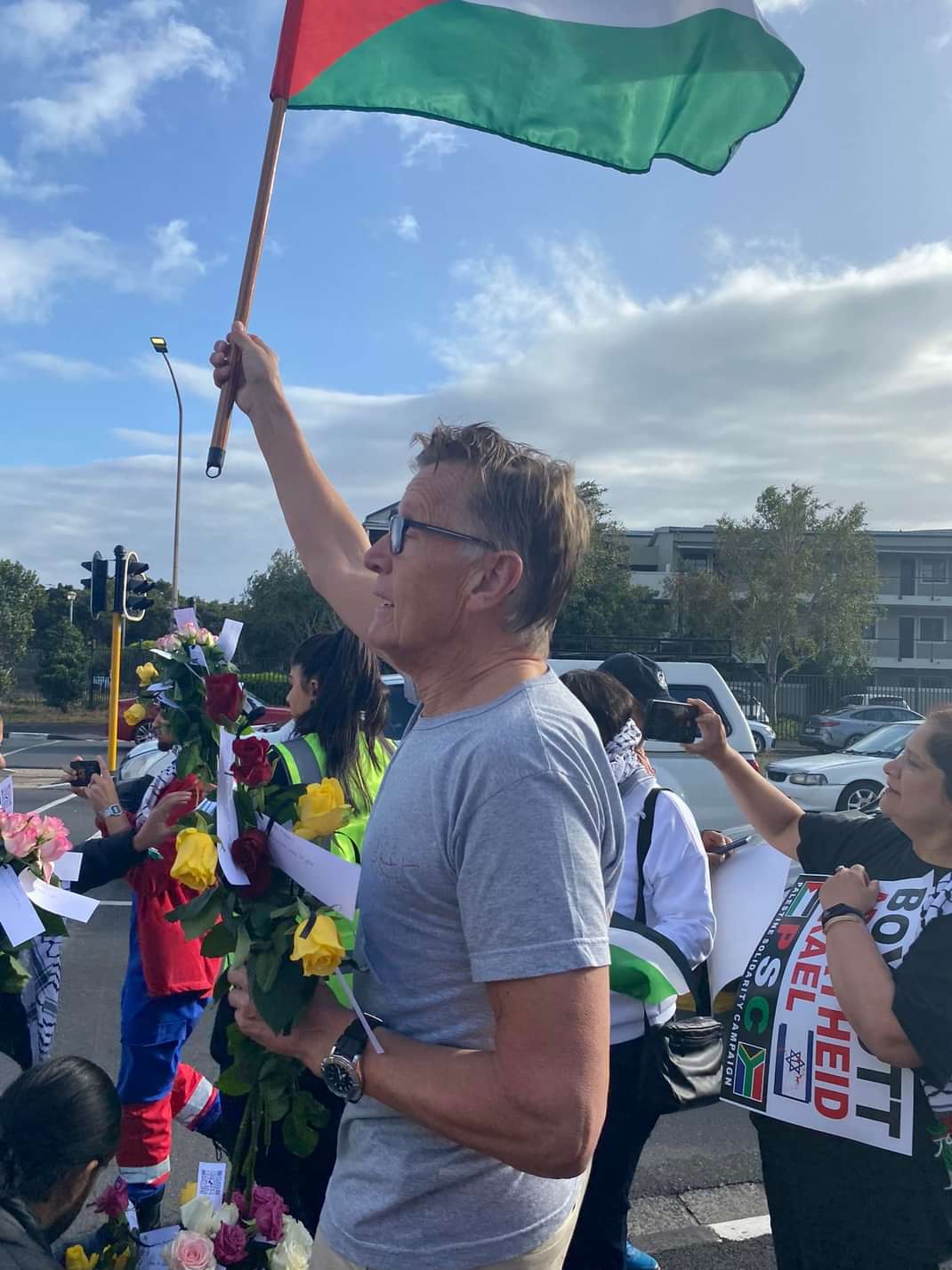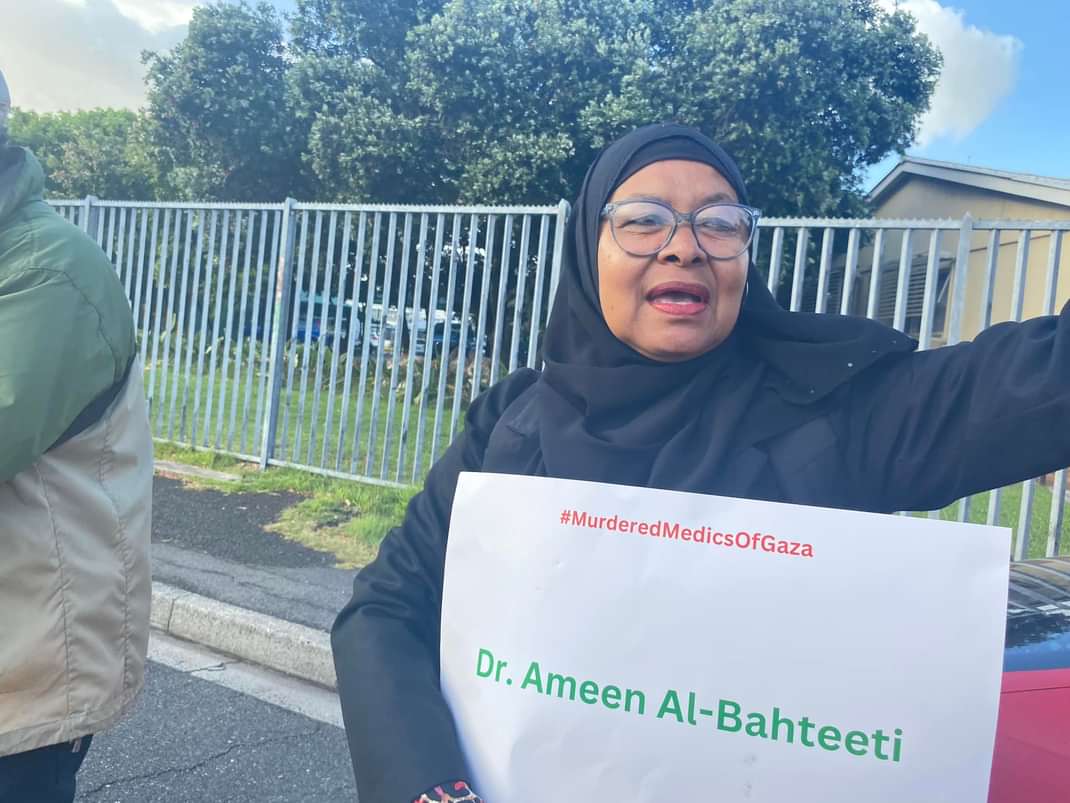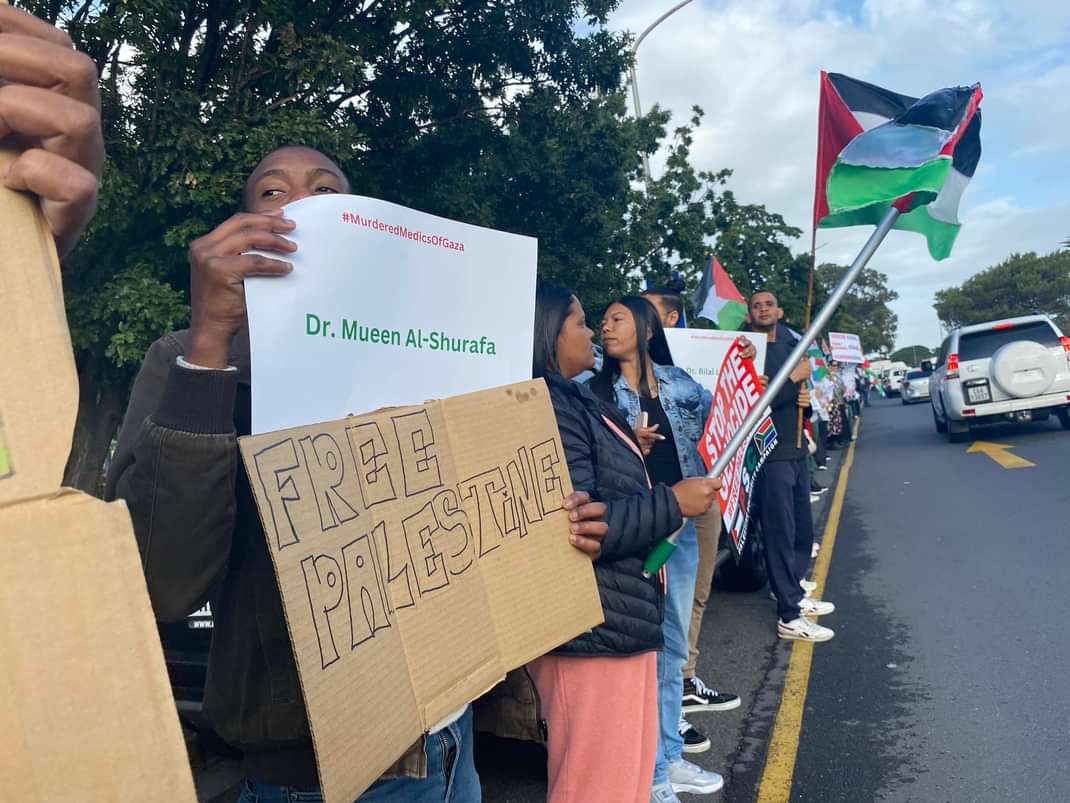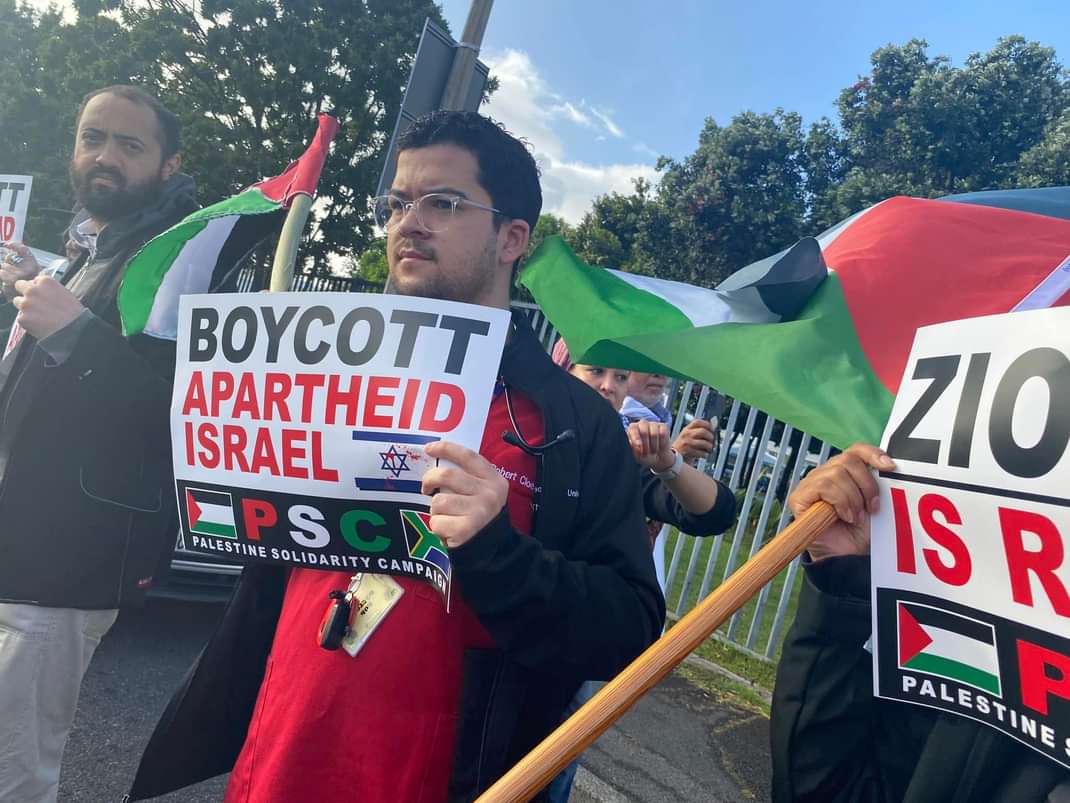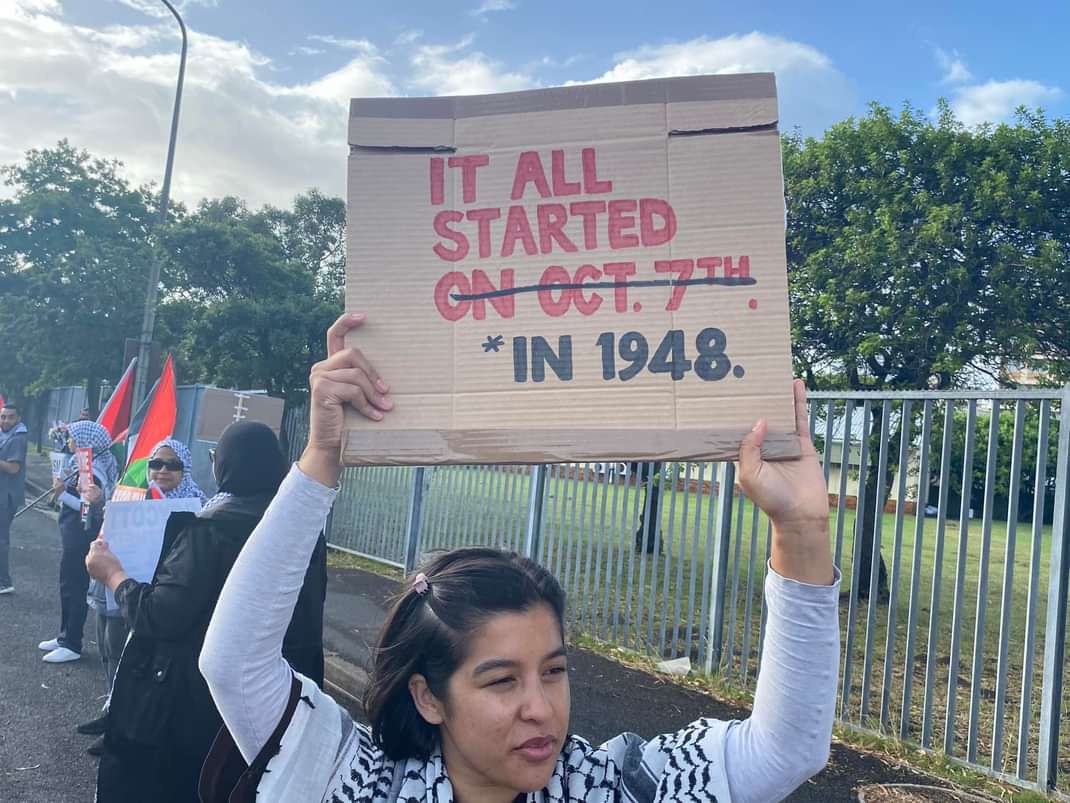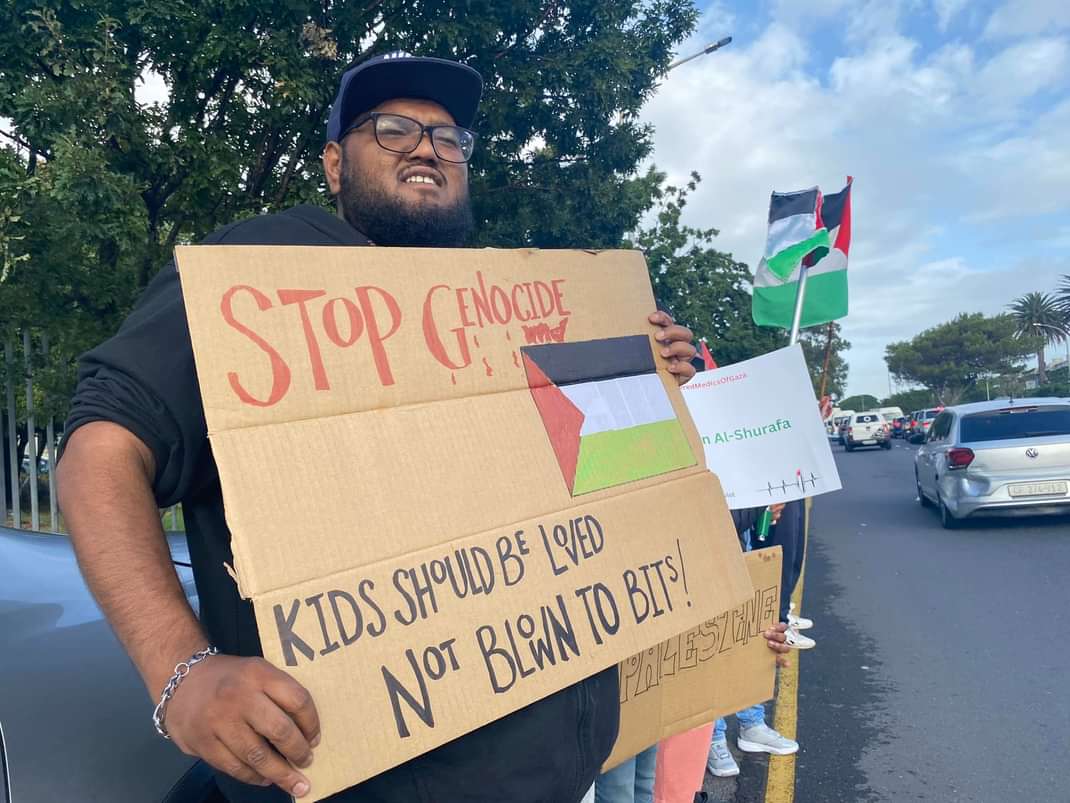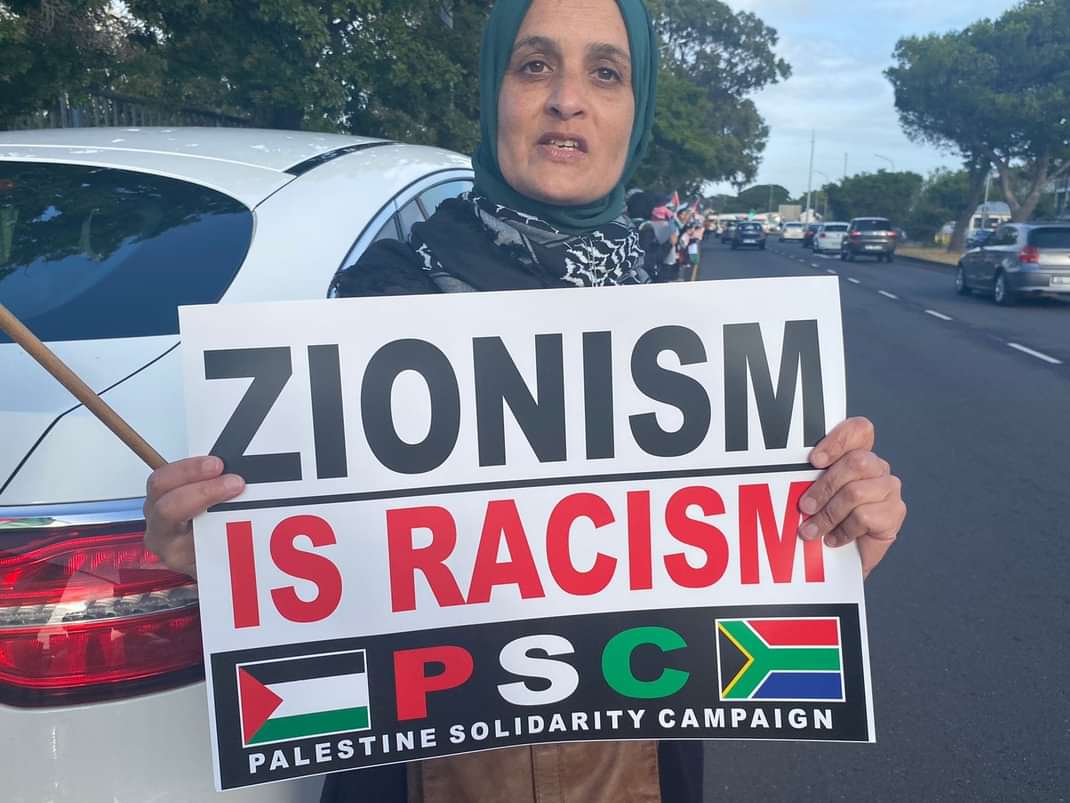Dr Mads Gilbert waving the Palestinian flag while participating in the protest
Cape Town – Prior to departing Cape Town, Dr. Mads Gilbert united with a multitude of healthcare professionals to create a poignant human chain outside the Red Cross War Memorial Children’s Hospital. This diverse assembly passionately rallied to denounce the relentless slaughter of hundreds of healthcare workers and the callous extermination of thousands of Palestinian children at the hands of Israel, in an unrelenting genocide.
However, they are not alone in their solidarity. Healthcare professionals worldwide have united to condemn the heartless killing of their colleagues in Palestine. British and American healthcare workers have risen in protest against their respective countries’ refusal to advocate for a ceasefire and their support in arming the Israeli army, enabling the perpetuation of the ongoing genocide. Much like their counterparts outside the Red Cross War Memorial Children’s Hospital, these healthcare workers prominently displayed placards bearing the names of Gazan healthcare workers tragically slain by Israel.
“It’s not a difficult conflict, it’s a difficult occupation.” Dr Mads Gilbert speaks to the protestors who are part of the human chain outside the Red Cross War Memorial Children’s Hospital and informs them he’s received news of a possible ceasefire.
A systematic attack of healthcare in Gaza
When Al-Ahli hospital fell victim to bombing, a chorus of denial quickly emerged, absolving Israel of blame. Accusations were flung at Hamas, with claims of misfires and accidents. This convenient narrative became a rallying cry for those advocating the destruction of Hamas. However, when the truth surfaced, revealing Israel’s culpability in the hospital bombing, an eerie silence descended. What unfolded, in Dr. Gilbert’s grim assessment, was a chilling “systematic attack on healthcare in Gaza”. Hospital after hospital became the target of bombings, invasions, and destruction—met with a disturbing silence that allowed the ruthless assault on Gaza’s healthcare to persist unchecked.
As per the World Health Organization (WHO), up until October 8th, a staggering 34 out of 36 hospitals in Gaza struggled to maintain some degree of functionality. Each medical facility was tasked with accommodating approximately 64 thousand individuals amid the relentless siege. However, the situation took a harrowing turn post-October 8th, within a mere five weeks, a chilling transformation occurred. Now, a meagre 8 hospitals cling to partial functionality, burdened with the colossal responsibility of tending to a staggering 247 thousand people each, including multitudes of displaced individuals huddled in the desolate corridors. All of this transpires under the cruel constraints of severed water, electricity, fuel, and food supplies, plunging the healthcare system into an abyss of despair.
Yet, the sinister saga continues. Palestinian healthcare workers must work with little to no resources. As if this weren’t enough, the areas surrounding hospitals bear the relentless brunt of consistent bombings, transforming these sanctuaries of healing into battlegrounds of peril. With water cut off, there is very little they can do to clean wounds and bandages. he consequence is a haunting escalation of infections in injuries, a gruesome revelation even extending to the medical professionals themselves, who now, in the chilling words of Dr. Gilbert, confront the grotesque presence of maggots infesting the wounds they endeavour to treat.
On Monday, Michael Ryan, executive director of WHO’s Health Emergencies Programme, told a United Nations briefing that health services in Gaza had suffered “catastrophic” damage. This comes after WHO were allowed into the Shifa Hospital more than 40 days after the genocidal war started.
“We now have 1.7 million people displaced so we have twice or three times the population [in the South of Gaza], using one third of the hospital beds in less than a third of the hospitals available.”
WHO has described Shifa Hospital, the flagship hospital of Gaza, as a “death zone”. There are mass graves at the entrance and only 25 staff are left to care for 291 critically injured patients.
Human lives being taken mercilessly
The issue extends beyond the direct assaults on hospitals. Disturbingly, as per the World Health Organization, from October 8th to November 12th, a staggering 152 attacks on healthcare have scarred Gaza, coupled with 158 assaults in the West Bank. The aftermath is a grim tally, with 38 ambulances reduced to wreckage in Gaza and 129 in the West Bank. In the line of duty, 38 healthcare workers in Gaza have suffered injuries, while 22 in the West Bank share the same fate. Perhaps most chillingly, the Palestinian Ministry of Health reports a staggering toll of at least 220 healthcare workers in Gaza who have paid the ultimate price, their lives extinguished in the midst of relentless attacks.
Doctors are working with nothing and slowly watching their colleagues’ lives being taken. This is a systematic attack on healthcare in Gaza. Israel continues to deny aid, to cut off water, electricity, fuel and food from those in Gaza which has led to a “slow, dying from complications, systematically shrinking the capacity of the hospitals to take care of the wounded,” said Dr Gilbert speaking on Radio 786.
The perversion runs even deeper. A hospital, a sanctuary of love, care, and compassion, becomes a nightmarish realm for Palestinians. Unlike the assurance most of us have when entering an ambulance, the certainty that from transport to discharge, safety and top-notch care are guaranteed, Palestinians face a grotesque deviation from this reality. Bombed, trapped beneath rubble, they’re ferried away in ambulances, unsure if these very vehicles will become targets. Upon reaching a hospital, the sickening uncertainty persists. Will there be medicine to tend to their wounds, or will the lack of resources render even the most skilled doctors helpless?
Even if treatment is provided, there’s no guarantee against infections lurking in wounds. All this unfolds amidst a relentless onslaught of bombs, an ominous backdrop where tomorrow holds the potential for Israeli airstrikes on hospitals. Hospitals, beacons of hope, love, and peace, are transformed into literal hells by the genocidal Israeli government. The looming threat of evacuation orders or sudden, deadly incursions leaves individuals stranded, condemned merely for their failure to escape the wrath that descends upon them.
In the words of Dr. Gilbert, “If you take healthcare away from people, you take hope away from people.” This sentiment encapsulates the deliberate strategy of the Israeli government: to strip away hope from the Palestinians, to dampen the collective belief that Palestine will one day be free. Yet, in the face of such adversity, our resolve must not waver. We are compelled to amplify our voices, broadcasting a resounding message to both the oppressors and the world: Regardless of the challenges we face, we remain steadfast in our commitment to see the land of Palestine liberated and free in our lifetime. It is through this unwavering determination that the spark of hope persists, ensuring that the dream of a liberated Palestine endures.
